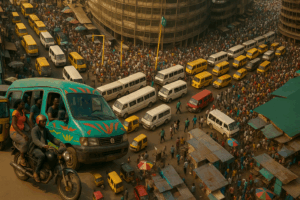Post-colonial African transport and mobility is characterised by significant road infrastructure development and technological innovation, on one hand, and historical chronic dysfunction on the other. Africa has experienced complex challenges in urban planning, infrastructure, and service provision which are apparent in public passenger transportation and mobility experiences within and between cities. Across southern Africa, urban public transportation is generally characterised by unreliability, uncertain waiting and traveling times, overcrowded vehicles and pick-up points, unique transport operators, and traffic congestion. The region has also seen significant growth in informal public transportation from the boda-bodas and matatus of West and East Africa and the mushika-shika and pirate taxis of Southern Africa which now co-exist with increasing smart mobility and ride sharing technologies.
The relationship between the urban transport sector, commuters, the broader economy, law enforcement, and policymakers has created complex networks which are yet to be fully studied. Therefore, the recent growth in the study of African urban transportation prompts the need to foster scholarly connections in the growing field. To fill this gap, we invite researchers in the Humanities and Social Sciences (history, geography, urban and development studies, policy, post-colonial, mobility studies and literary-cultural studies) among other fields to a workshop on Transport and Mobility in Southern Africa. The workshop will provide a dedicated platform for early career researchers to present, discuss and refine their work as well as opportunities for networking, collaborative and multidisciplinary interaction in pursuit of sustainable and context-relevant innovative research and solutions to
Post-colonial African transport and mobility is characterised by significant road infrastructure development and technological innovation, on one hand, and historical chronic dysfunction on the other. Africa has experienced complex challenges in urban planning, infrastructure, and service provision which are apparent in public passenger transportation and mobility experiences within and between cities. Across southern Africa, urban public transportation is generally characterised by unreliability, uncertain waiting and traveling times, overcrowded vehicles and pick-up points, unique transport operators, and traffic congestion. The region has also seen significant growth in informal public transportation from the boda-bodas and matatus of West and East Africa and the mushika-shika and pirate taxis of Southern Africa which now co-exist with increasing smart mobility and ride sharing technologies.
The relationship between the urban transport sector, commuters, the broader economy, law enforcement, and policymakers has created complex networks which are yet to be fully studied. Therefore, the recent growth in the study of African urban transportation prompts the need to foster scholarly connections in the growing field. To fill this gap, we invite researchers in the Humanities and Social Sciences (history, geography, urban and development studies, policy, post-colonial, mobility studies and literary-cultural studies) among other fields to a workshop on Transport and Mobility in Southern Africa. The workshop will provide a dedicated platform for early career researchers to present, discuss and refine their work as well as opportunities for networking, collaborative and multidisciplinary interaction in pursuit of sustainable and context-relevant innovative research and solutions to postcolonial transportation in Southern Africa.
Ideally, the workshop targets masters students, doctoral students and post-doctoral researchers focusing on different aspects of post-colonial urban transportation and mobility in Southern Africa. The target group will be given a platform for interaction with seasoned scholars for mentorship opportunities and to strengthen professional connections.
We invite abstracts focusing on, but not limited to the following research areas:
- The political economy of public transportation
- The relationships between state, private sector (including formal and informal transportation), and commuters
- Social dynamics in commuting and urban mobility
- Gender and urban mobility
- Commuter resilience and resilience and resistance
- STS Approaches to understanding postcolonial urban mobility
- Expertise, ingenuity and knowledge production surrounding postcolonial urban mobility
- Historiographical and theoretical approaches to understanding mobility
- Dilemmas of sustainability issues vs informal transportation in Africa
- Contemporary experiences of public transportation and the practices of reading, writing, narration and literary imagination in Africa
Important information
The workshop has limited funding for travel and accommodation. In your application, kindly highlight if you need to be considered for travel and accommodation assistance. However, priority will be given to graduate students from institutions that do not provide funding.
Submit your abstract to: ysiworkshop@ufs.ac.za
Abstract length – 200 words
Abstract submission deadline – 30 August 2025
Abstract outcome – 10 September 2025


